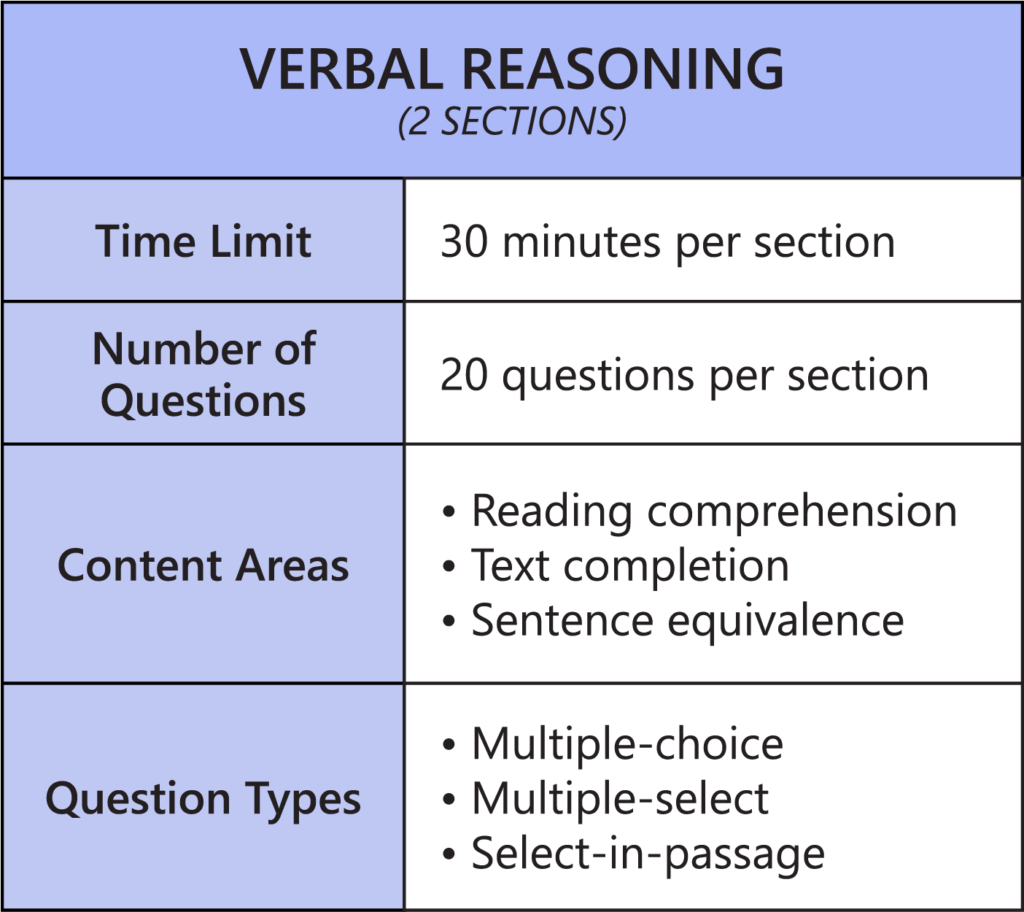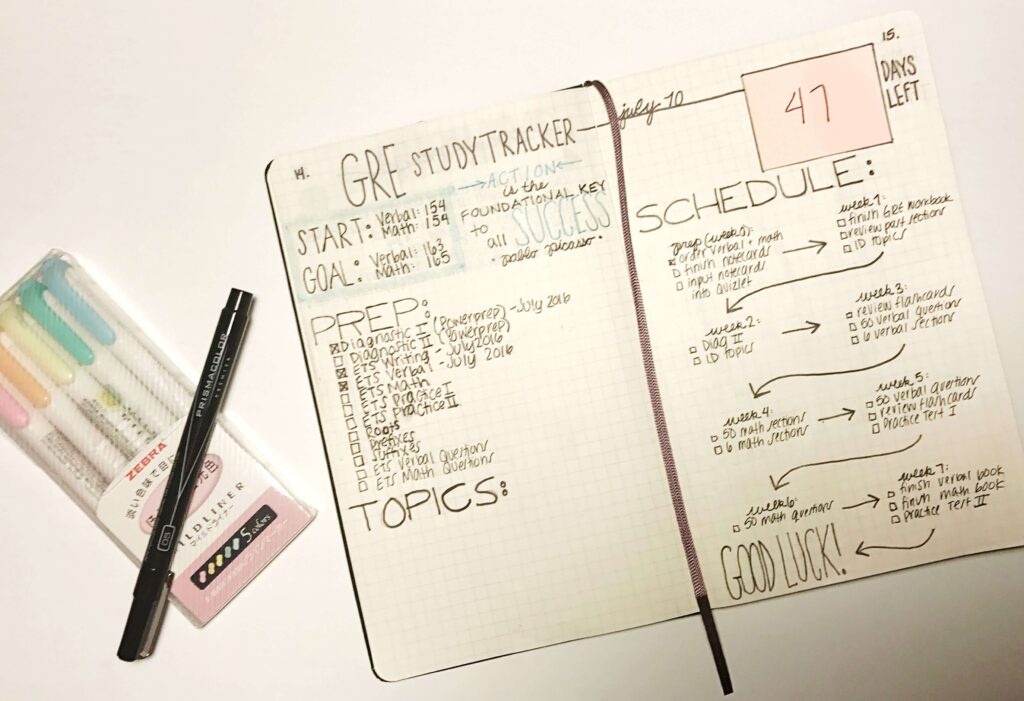Cracking GRE verbal requires a certain amount of effort and dedication. If you look at any set of GRE verbal questions, at a first glance, you will feel that perhaps all the problems are vocabulary related problems. If I know certain amount of vocabularies, I would definitely do well in the verbal section. Most of the aspirants start their initial journey with this misconception. It is because many blogs and other people came up with a list of 1000 – 1500 words and claim that if you remember these words, you will be able to score well. Some test prep companies design their verbal section in an obtrusive way and through a bunch of gruesome words. This forces the prospective test takers to think that the verbal section of GRE is vocabulary intensive.
What is measured in the GRE verbal section?:
If you go to ETS website, it explicitly mentions about three things that the test is designed to measure your ability:
- To probe, extract and synthesize information obtained from the given material.
- To identify the relationships among different components of sentences.
- To understand relationships among words and fundamental concepts.
Get Familiar with the format and question types:
The verbal section of GRE consists of 20 questions, which appear twice in the real exam. GRE is an adaptive exam. It adapts the difficulty of the exam based on the performance of the examinee during
the test. Therefore, for both verbal and quant – an examinee encounters two different sections. The score of GRE span over from 130 to 170. In general, the verbal section of GRE consists of three different types of questions as follows:
Text completion:
This type of questions assess the ability by omitting key words from short passages and asking you to fill in the blanks with words or short phrases from the remaining information
in the passage.
Sentence equivalence:
This type of question is designed to assess your ability to conclude how a passage should be completed based on partial information, but they are more concerned with the meaning of the
completed whole.
Reading comprehension:
Reading comprehensions questions are based on some short or long passages and ask different types of questions to assess your reasoning ability for drawing conclusions.

Cracking GRE verbal – how difficult it is?
Difficult words, quirky syntax and condensed passages on obscure subjects can make even the most devoted readers tense. Just imagine, if someone has to solve a section of 20 questions in a timed environment which has all the mentioned elements, then how difficult it would seem to be. If one does not have the habit of quick and deep reading, then the language of verbal section will appear to be incomprehensible and academic hieroglyphics. This will lead someone to think that cracking GRE verbal is almost impossible.
To perform well, you need to develop a quick and deep reading skills. This will not grow overnight.
Do not get confused by hearing about someone’s success who cracked the GRE within one month. May be that person had already worked on developing the required skills during his/her undergrad studies. Then, s/he just studied for one month for GRE exam. Here in this article we are sharing some tips that will
help you to prepare well for the GRE verbal section.
Attempt a mock test first:
“Assess thyself” – this is the saying of wise GRE buddha. Find an official guide book from ETS, and attempt
at least one full length test before you start your journey. Once you attempt the test, then you will be
evaluate certain parameters. For example, how strong your vocabulary is? How good your reading skill is?
How quick you can reason? What type of difficulties you are having while drawing a conclusion? This type of assessment will help you to identify your weakness and devise your study plan accordingly.
Devise a study plan with milestone:
For cracking GRE verbal, you must have a study plan. When you make a study plan, fix a set of milestones for a definite time frame. For example, do not just plan to learn 1000 GRE vocabs within 3 months. Rather set a milestone learning 10-15 vocabs or practicing at least 10 verbal questions everyday. Always remember “consistency is the key”. If you think you will be able to study one hour daily for verbal section, then do so. Always make your time frame real. Do not overcommit yourself to some thing that you will not be able to maintain or do consistently.

Learn vocabularies:
One of the most important components of the GRE Verbal section is vocabulary. A strong vocabulary can help you better understand the text you read, and it can also help you find the right words to complete text completion questions. To improve your vocabulary, you can:
Read widely:
Try to read a variety of texts, including books, articles, and magazines, in English. This will help you encounter new words and learn the meaning of words in context.
Use flashcards:
Flashcards are a great way to memorize new words. You can make flashcards with words on one side and their meanings on the other. Try to use these flashcards every day until you have a good understanding of the words.
Practice using new words:
Once you have learned new words, try to use them in your everyday conversation and writing. This will help you to solidify your understanding of the words and make them a part of your active vocabulary. Sometimes, the words have secondary meaning and ETS love to put those words in the questions. For example, “Qualify” is is perhaps the most commonly confused secondary meaning and the one that is most important to learn for the GRE. To qualify is to limit, and is usually used in the context of a statement or an opinion. Always look for such type of words that have secondary meanings and make a separate list for those.
Practice active reading:
This is an essential skill for cracking GRE verbal. You need to understand written material, analyze and evaluate it in order to do well in the verbal section. Therefore, you need to practice active reading. Active reading is a strategy that involves actively engaging with the text you are reading, asking questions, and making connections between the text and your own knowledge and experiences. To practice active reading, you can:
Highlight or underline key information:
When you read a passage, try to highlight or underline key information or passages that answer the questions you have.
Take Notes:
Try to take notes on the passage, summarizing key information and answering questions. This will help you to engage with the text and to better understand the content.
Ask questions:
As you read the passage, try to ask yourself questions about the content. What is the main idea?
What is the author trying to convey? What are the key pieces of information in the passage?
Understand context clues:
Context clues are hints within the text that can help you determine the meaning of words. Understanding context clues is critical for Text Completion questions, as it allows you to deduce the meaning of words based on the words that appear around them. When you read passages or practice questions always try to determine the meaning of words based on the context clues within the text. It will help you to figure out the meaning of unknown word if you encounter. This is an advanced skill that is required for cracking GRE verbal.
Learn to skim for key information:
Skim reading is an efficient tool to read and digest longer texts quickly and efficiently. It helps to quickly locate specific information in a passage. It takes less time because not all of the words in paragraphs or sections are read, but it still provides a general idea and understanding of the text. It is obvious that with skimming, your overall understanding is reduced because you don’t read everything. But it helps you a lot when you are facing time crunch during the actual exam. Sometimes an examiner finds it difficult to manage time to solve all the reading comprehension questions. Rather than blindly selecting some options, an effective skimming might bring some luck. Therefore, when you practice reading comprehension questions, always try to skim to see whether you can locate key information or not.
Practice from only ETS materials:
You will often find verbal practice questions from different test prep sources are vocabulary intensive. ETS has very specific R&D team whose only job is to produce appropriate verbal questions based on the guidelines of ETS. They invest a lot of money on that. Not every test prep company spend such amount of money on preparing verbal materials equivalent to ETS. So, how they make their questions make difficult? One easy way is to put inscrutable words that one barely uses in regular academic writing. If you practice materials from any third party sources, be aware of that. For quant, practicing from third party materials is OK. But for verbal, always stick to ETS materials. For guidelines about resources, you can follow this article.
Follow the same course of action consistently:
When you practice, always follow the same course consistently. Without looking at the options, read the question first. Try to understand what the question asked, first. Then look at the options, track the meanings of unknown words and note them down. Return to the question and try to fill in the answer based on reasoning. Then verify the solution, and if it comes out to be wrong, then try to figure out where you made it wrong. Make a note of it, if possible. Initially, this task might be overwhelming; but if you start doing it consistently for couple of weeks, then it will grow into a habit. Trust me this will help you a lot. If you can document everything properly, you will realize that the ETS questions follow a pattern,
words are being repeated. I have found this approach to be very beneficial.
Think like as test writers:
This is an advanced skill. You need to learn not get trapped by the answer choices that were set by the test writers. So look for such pitfalls or traps in the questions or even in the given options. When you solve a question try to figure out – why the correct answer was right, and why your original answer was wrong.
To conclude, when you are preparing for any kind of standardized tests, never rush to prepare for it. Always have a plan and that should be solely yours. Because it is only who truly knows the strength and weakness within yourself, and make your study plan accordingly.
Disclaimer: ChatGPT was used to compile information. The content of this article is author's original work.


Pingback: How to Ace the GRE Analytical Writing Section? - gradbunker.com